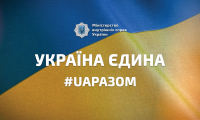
The International Holocaust Remembrance Day, which is commemorated on January 27, was officially adopted by the UN General Assembly on November 1, 2005. On this day in 1945, the troops of the 1st Ukrainian Front entered the Nazi Auschwitz death camp. This camp has become a symbol of Nazi crimes in the modern world.
The purpose of this sadly memorable date is to actively educate and assist in the prevention of possible future acts of genocide and contempt for the value of human life.
The international community "unequivocally condemns all manifestations of religious intolerance, incitement, persecution or violence against individuals or communities based on ethnic origin or religious beliefs, wherever they may be," the resolution said.
It is worth recalling that “Holocaust” is translated from Greek as "burning" and means the systematic persecution and extermination (genocide) of Jews by Nazi Germany and collaborators during 1933-1945. In a broader sense, the Holocaust is the systematic persecution and extermination of people because of their race, nationality, sexual orientation or genetic type as defective and harmful.
According to the Resolution of the Verkhovna Rada of Ukraine of 05.07.2011 "On the 70th anniversary of the tragedy of Babyn Yar", in our country, Holocaust Remembrance Day has been commemorated since 2012. In Ukraine, there are about 1,200 sites of mass executions and burials of Jews during the Holocaust of 1941-1944. Such tragedies took place throughout the occupied territory of Ukraine: in Kyiv - the tract "Babyn Yar", which became one of the symbols of the Holocaust, in Lviv - Yanivskyi camp, Drobytskyi Yar in Kharkiv, in the village of Bohdanivka, Mykolaiv region, in Kamianets-Podilskyi, Khmelnytsk region. The Holocaust of the Jews in the Nazi-occupied territory of the USSR differed from similar measures in Europe. There the Jews were driven to ghettos, and later could be sent to places of mass extermination in gas chambers. In Ukraine, the majority of the Jewish population was executed immediately after the Nazi occupation of these territories.
In Kharkiv the population census of the city began on December 5, 1941, and Jews were included in special "yellow" lists, which contained 10,271 names of Kharkiv Jews, of whom more than 75% were women, children and the elderly. On December 14, 1941, by order of the city's military commander, all Jews were obliged to move to the HTZ area within two days. A Jewish ghetto was organized in the workers' barracks that remained after the construction of the plant. According to sources, groups of 250-300 people were taken out of the ghetto every day and taken to Drobitsky Yar for execution. As early as the beginning of 1942, the Kharkiv ghetto ceased to exist. The captured Red Army soldiers and mentally ill people were also executed in the ravine. In total, between 16,000 and 20,000 people were executed there.
On Remembrance Day, six candles in memory of the six million victims of the Holocaust, will be lit by Ukrainian public officials, heads of diplomatic missions, former prisoners of ghettos and extermination camps, and the Righteous Among the Nations.
In Ukraine, meticulous work continues to study the problems of the Holocaust, to find unique documents of that time, the names of dead people and places of mass burial. A significant contribution to this noble work is made by the International Institute for Study of the History of Holocaust, “Yad Vashem” Memorial Museum, and one of the departments of the Institute of Political and Ethnonational Studies named after I.F. Kuras NAS of Ukraine.
This year according to UN recommendations, special attention will be paid to the Holocaust and human dignity at memorial events. Stories from the lives of Holocaust survivors are not only stories of pain and suffering, but also of victory and rebirth. On January 27, mourning rallies will be held in Ukraine, exhibitions will be opened in museums and libraries, round tables and commemoration meetings will be held in schools.
The tragedy of the Holocaust as a memory of generations and a lesson for humanity must be remembered and never allowed again.
Volodymyr Hrechenko, Professor of History